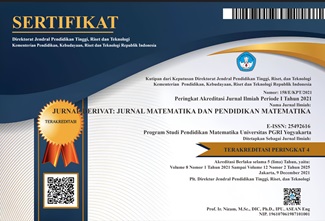Pengembangan Media Pembelajaran Berbasis Flipbook Pada Materi Sistem Persamaan Linear Dua Variabel Dikelas VIII SMP
DOI:
https://doi.org/10.31316/j.derivat.v8i1.1678Abstract
Technological progress is very rapid, especially in the field of education, so teachers and students need to use technology in learning. ICT-based learning media is one of the uses of technology in education with the hope of improving the quality of learning. This study aims to determine the process and produce a product in the form of-based learning media flipbook on the material of a two-variable linear equation system in class VIII SMP. This research is a development research using the ADDIE development model. The data collection technique used is a non-test technique with a data collection instrument in the form of a validation sheet filled out by the validator. Data analysis used quantitative descriptive data analysis. Overall, the feasibility assessment of-based mathematics learning media flipbook on two-variable linear equation system material obtained an average of 85.70%, so-based learning media flipbook on two-variable linear equation system material in class VIII SMP is interpreted as very valid for use.
Keywords: Learning Media, Flipbook, Material of Two Variable Linear Equation Systems, Validity
Downloads
Published
Issue
Section
Citation Check
License
Authors who publish with this journal agree to the following terms:
-
Authors retain copyright and grant the journal right of first publication with the work simultaneously licensed under a Creative Commons Attribution-ShareAlike 4.0 International License that allows others to share the work with an acknowledgment of the work's authorship and initial publication in this journal.
- Authors are able to enter into separate, additional contractual arrangements for the non-exclusive distribution of the journal's published version of the work (e.g., post it to an institutional repository or publish it in a book), with an acknowledgment of its initial publication in this journal.
- Authors are permitted and encouraged to post their work online (e.g., in institutional repositories or on their website) prior to and during the submission process, as it can lead to productive exchanges, as well as earlier and greater citation of published work (See The Effect of Open Access).







